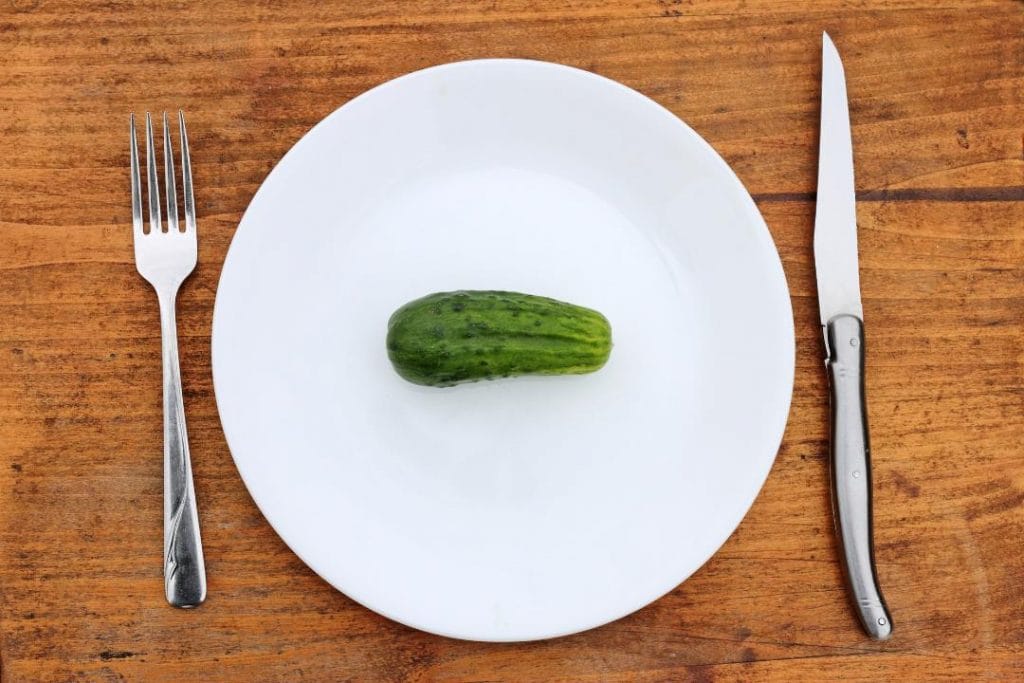If you want to achieve long-term weight loss, you need to understand that crash diets just don’t work. To find out why these diets fail, read this article!
 What if your special new diet was actually setting you up for failure?
What if your special new diet was actually setting you up for failure?
Many people embrace “crash diets” as a way of quickly losing weight, especially when a major event is around the corner. However, it turns out that fad diets are actually terrible for your long-term health.
Keep reading to discover more about these diets and why they are all eventually doomed to failure!
What Are Crash Diets?
“Crash diet” is a catch-all term for a variety of specialized diets. Each of them has a singular goal: to help you lose weight in a short time.
Some of these may be classic speed diet tricks packaged with a new name, such as the Whole30 or The 21 Day Fix. Others are basically detox programs that focus on specialized liquid diets as a way of quickly losing weight.
For many people, crash diets may be able to yield short-term results. That is why they’re so popular: skeptics who try the diets out can almost instantly start seeing results for themselves and their friends.
However, short-term results may quickly turn disastrous. And there are five solid reasons why you should give fad diets a pass!
1. Water, Water Everywhere
Many of these crash diets have a similar theme: cutting down on carbs or even eliminating them out entirely. This is one of the main reasons why the diet seems to be working in the short-term.
Your body holds water based on the amount of carbs you consume. Therefore, cutting out carbs will increase urine volume because you’re not retaining as much water.
Sure, you’ll look thinner after a few days because your body has gotten rid of the water it once held onto. But there’s a catch: resuming your normal diet or simply drinking more water can return you to your previous size. That’s why this simply doesn’t work.
2. Metabolic Issues
Your metabolism is the key to meeting your long-term weight loss goals. Boosting your metabolism leads to better overall health and weight loss.
Unfortunately, crash diets can actually hurt your metabolism in the long run. This is because your metabolism takes its cues from the rest of your body, and a sudden crash diet can send things into a panic mode.
Normally, your metabolism stays in a fat-burning mode. This is a good thing, and certain diets (such as keto) focus on enhancing that mode.
However, most crash diets basically involve starving yourself. And when your body thinks you’re starving, it actually switches your metabolism over to fat storage instead.
This means your body is going to hold onto every calorie it gets as a way of preserving your health. So returning to a normal diet or even treating yourself to the proverbial “cheat day” can actually undo all of your previous weight loss.
You can keep your metabolism going by eating healthy snacks throughout the day. There are some great options you can view here!
3. Bad for Your Health
So far, we’ve focused on crash diets being bad because you will eventually gain all that weight back, possibly with some extra added! But did you know these diets can also affect your health on long-term?
Most people lose weight, gain it back, and then start another crash diet to try to lose it. This is referred to as “yo-yo dieting,” and can wreak havoc on your health.
Furthermore, it can make your more susceptible to diabetes and heart disease due to alterations in your glucose tolerance and fat levels.
We really can’t put it any plainer than this: those who keep going back to crash diets are playing Russian roulette with their long-term health, and they’re bound to eventually lose.
4. The Carb Game
As we said, many people use crash diets that involve skipping out on carbs. If you’re not careful, though, this will lead to even more carb consumption!
This is because suddenly restricting your calories may lead to a reduction in your insulin levels. You may get sudden cravings for carbs and start wolfing them down. This leads to a vicious cycle: the carbs will activate your neglected insulin, and the insulin will make your body store fat.
It may not happen to everyone, but this is a pretty clear argument for embracing a sensible diet and steady weight loss instead of trying to rush everything.
5. Fat Deficiency Issues
Obviously, anyone who’s on a diet sees fat as their enemy. However, health is more complicated than that, and some fats are actually good for you.
Certain fatty acids, for instance, promote a healthier body and can even keep your metabolism up. A crash diet that cuts out as much fat as possible may be cutting out the fatty acids you need.
And it will eventually catch up to you.
Your body is actually craving those fats you’ve been cutting out, so as soon as you give up the diet, you’re more likely to binge eat. To top it off, your compromised metabolism will make it harder to lose or maintain your weight.
What’s the Verdict?
There’s a phrase that everyone looking to drop weight hates to hear: “it’s not about changing your diet, it’s about changing your lifestyle.”
This statement is completely true. Long-term health and weight loss are tied to moderating your diet with healthy foods and increasing your physical activity.
Crash diets simply are not sustainable in the long-term. They offer quick results, but your body is likely to hold those calories as soon as you return to a normal diet.
Combined with the health problems crash dieting can cause, it’s safe to say you’re better off with a regular diet!
The Bottom Line
Now you know what crash diets are and why you should avoid them. But do you know where to find a diet that works?
At Picklee, we are dedicated to helping you balance your home and your health. To see how we can help you reduce calories the clean and natural way, check out our skinny recipes today!
